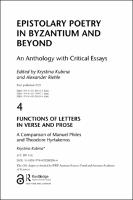Chapter 4 Functions of Letters in Verse and Prose
Proposal review
A Comparison of Manuel Philes and Theodore Hyrtakenos
Author(s)
Kubina, Krystina
Collection
Austrian Science Fund (FWF)Language
EnglishAbstract
Letters were an important medium of everyday communication in the ancient Mediterranean. Soon after its emergence, the epistolary form was adopted by educated elites and transformed into a literary genre, which developed distinctive markers and was used, for instance, to give political advice, to convey philosophical ideas, or to establish and foster ties with peers. A particular type of this genre is the letter cast in verse, or epistolary poem, which merges the form and function of the letter with stylistic elements of poetry. In Greek literature, epistolary poetry is first safely attested in the fourth century AD and would enjoy a lasting presence throughout the Byzantine and early modern periods. The present volume introduces the reader to this hitherto unexplored chapter of post-classical Greek literature through an anthology of exemplary epistolary poems in the original Greek with facing English translation. This collection, which covers a broad chronological range from late antique epigrams of the Greek Anthology to the poetry of western humanists, is accompanied by exegetical commentaries on the anthologized texts and by critical essays discussing questions of genre, literary composition, and historical and social contexts of selected epistolary poems.
Keywords
Literary Criticism, Mediterranean Literature, Poetry, Greek literatureDOI
10.4324/9780429288296-6ISBN
9780367255312, 9780367759971Publisher
Taylor & FrancisPublisher website
https://taylorandfrancis.com/Publication date and place
2021Grantor
Imprint
RoutledgeClassification
Literature: history and criticism


 Download
Download